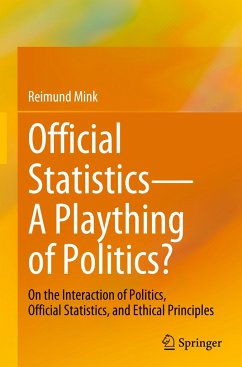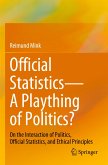This book describes official statistics as a tool to hold up a mirror to society - but also as an instrument for those who can manipulate this mirror. It addresses the precarious interaction of politics, official statistics, and ethical principles. Three sets of themes can be derived from this relationship, which are the focus of this book: Political systems and guiding principles, official statistics as a science of the state, and ethical issues arising from them. Ultimately, the determining factor is the political system that exists in each case.
The book contains eleven chapters. The first three focus on the key concepts of the book: power and morality, official statistics and policy making, and ethical principles for statistical work. Three further chapters focus on episodes that illustrate, as "drastic" examples, the misuse of official statistics over the past hundred years, covering the situation in the Soviet Union, the Third Reich and Greece. The remaining five chapters take up current topics that pose particular challenges to official statistics. These are the phenomena paraphrased by digitalisation, globalisation, happiness research, overpopulation, migration, the Covid-19 pandemic and climate change.
The book is primarily aimed at statisticians working in national and international statistical institutions, but also at readers interested in statistics, national accounts, economic and statistics history, and ethical issues.
The book contains eleven chapters. The first three focus on the key concepts of the book: power and morality, official statistics and policy making, and ethical principles for statistical work. Three further chapters focus on episodes that illustrate, as "drastic" examples, the misuse of official statistics over the past hundred years, covering the situation in the Soviet Union, the Third Reich and Greece. The remaining five chapters take up current topics that pose particular challenges to official statistics. These are the phenomena paraphrased by digitalisation, globalisation, happiness research, overpopulation, migration, the Covid-19 pandemic and climate change.
The book is primarily aimed at statisticians working in national and international statistical institutions, but also at readers interested in statistics, national accounts, economic and statistics history, and ethical issues.








